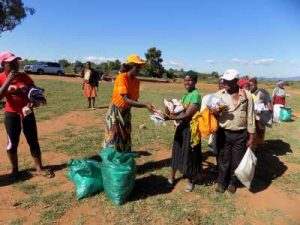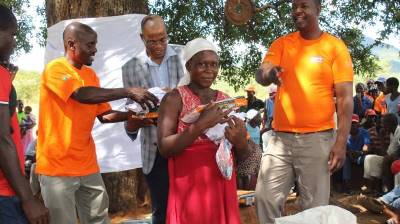
by dapp | May 21, 2020 | Blog, News
As the world continues the fight against COVID -19, the gains made in fighting HIV/AIDS must be maintained. Following the extension of the nationwide lockdown in Zimbabwe, HOPE Bindura’s voluntary counseling and testing (VCT) centre resumed offering HIV counseling and testing to the Bindura community in May 2020.
HOPE Project Leader Rebecca Njopera says providing HIV health services such as HIV prevention, testing and treatment remains a priority during the level 2 lockdown period in order to reach the 95-95-95 targets. “As we resume the services, we continue to adhere to laid down precautionary measures of social distancing, and hand washingt among others. The nurse and staff manning the testing centre worked together to ensure that both clients and the staff are safe.
New measures implemented to protect clients and staff:
- Both clients and staff are screened for COVID-19 symptoms before entering the clinic
- Both clients and staff wear face masks in the centre
- Water and Soap and hand sanitizer are provided for both staff and clients
- Staff advises clients on safe physical distancing.





by dapp | Apr 26, 2020 | Blog, News
World Malaria Day, which takes place on 25 April each year, is an internationally recognized day, highlighting the global efforts to control malaria and celebrating the gains that have been made. The global theme for World Malaria Day, ‘Zero Malaria Starts with Me’, emphasizes everyone’s power and responsibility – no matter where they live – to ensure no one dies from a mosquito bite. DAPP Zimbabwe remains committed to eliminate malaria in Zimbabwe. We reflect on the recently ended Global Funded E8 project on Malaria under the ADPP Mozambique consortium.
The project was aimed to support national cross- border and district community based malaria elimination programs to address the problem of cross-border parasite transportation between the high and low endemic countries through targeting the migrants and mobile populations and the local malaria transmission in underserved hard to reach communities in border districts. The project was premised on four strategic approaches namely
- Community mobilization and empowerment with advocacy, Information Education and Communication (IEC) for demand creation and utilization
- Early diagnosis and testing with Rapid Test Kits and quality control with Microscopy
- Treatment, referral, follow up and radical cure with combination malaria drugs
- Surveillance and tracking of cases with monitoring and evaluation
The project main results were:
- Construction of 5 Border Health Posts to serve the population around border areas and Migrant and Mobile Populations in Beitbridge, Rushinga, Mutasa, Mudzi and Chiredzi.
- Health Posts successfully offered Malaria treatment including some Primary Health Care services as agreed by the District Health Executives (DHEs).
- Enhanced Malaria Participatory approaches with campaigns and cooperation with all locally recognized structures.
- EHTs managed to carry out Case investigations and identification of breeding sites in pursuant to control of malaria.
- Registered General Nurses (RGNs), Environmental Health Technicians (EHTs) and the Project staff combined in advancing Social behaviour change communication within the far to reach communities on Malaria awareness.
- Strengthening communities on local collaboration through Community Advocacy meetings which engaged local leadership and cross border communities.
- Enhanced community testing and treatment of malaria by VHWs.
- Mobilization for Indoor Residual Spraying (IRS) Programs at Household level & Feedback meetings with Village Health Workers.
- Each Health Post managed to form a Health Centre Committee to spearhead local development of the health post.

by dapp | Apr 7, 2020 | Blog, News
The Early Actions intervention program is proving to be effective in contributing to increased resilience among 500 households in wards 6 and 9 of Chimanimani, Manicaland province. The early actions funded by the Danish Emergency Relief Fund (DERF) saw families receiving vegetable seeds such as butternuts, sugar beans, okra, tomatoes, carrots towards rehabilitating their gardens.

Seed handover

Seed planting
DAPP Programs Manager, Petros Muzuva says the actions are addressing food insecurity by providing stable and rapid access to nutritious food through assisting families restore 500 household gardens in Chimanimani district.
“The idea is that farmers should grow vegetables for household consumption and surplus for sale to raise income. He added that the action will ultimately contribute to food and nutrition security through implementing best agronomic practices and techniques which have proven to be effective in building resilience in the face of climatic change effects.
Through training on the best farming practices such as composting, crop diversification and soil protection farmers have enhanced agriculture practices resulting in increased yields. So far households’ have started to see a reduction in in their food expenditure as they are getting food from their own gardens.
DAPP Zimbabwe is implementing this project through the support from UFF HUMAMA

by dapp | Mar 25, 2020 | Blog
AT least 2 500 Cyclone Idai victims in Shinja area of Chimanimani have received 6,3 tonnes of garden vegetable seeds worth US$40 000 from Development Aid from People to People (DAPP) Funded by the Danish Emergency Relief Fund (DERF), DAPP handed over the donation to ward six and nine beneficiaries, of which 63 percent of them were women.
The villagers received a variety of vegetable seeds which include butternuts, sugar beans, okra, tsunga, covo, rape, tomatoes, carrots, spinach and king onions.
Speaking on the sidelines of the handover ceremony, DAPP Zimbabwe country director, Mr Mathias Paradzai, said the donation was aimed at enhancing and improving food security, nutrition and incomes of the targeted households.
“There is room for the households’ livelihoods to improve through availing agricultural inputs. This will increase household disposable income and reduce expenditure on food products.
“DAPP, with the support of the Danish Emergency Relief Fund stands with the people of Zimbabwe and are trying to assist families in Chimanimani District to live healthier and more resilient lives.
“The successful handover we are celebrating today was made possible by the unity and hard work of men, women, youth and leaders in the district,” he said.
The beneficiaries were selected from 1 000 households that participated in the DAPP Zimbabwe’s DERF food hand-outs and non-food items distribution programme which was implemented from May to August 2019.
In an interview, DAPP programmes manager, Mr Petros Muzuva said distributing the seeds was an early action programme for the victims of the devastating disaster.
He said vulnerable children and people living with disabilities were not an exception as they benefited through the organisation’s Child Aid Programme.
“The idea is that farmers should grow vegetables and they gain on both ends as they get their nutrients from the vegetables they grow as well as income from selling the produce. We are working together with Government and other developmental partners to see that these people’s lives are revived.
“Ultimately, the action will contribute to the country’s food chain emergency by implementing best agronomic practices and techniques which have proven to be effective in building resilience ahead of climatic change effects,” he said.
SOURCE : MANICA POST

by dapp | Mar 5, 2020 | Blog, News
Ponesai Vanhu Technical College (PVTC) in partnership with Chaminuka Vocational Training Centre (Cham tech ) have introduced the TVET for all through Public -Private partnership in Zimbabwe program. The pilot project is expected to equip benefit 400 youths from disadvantaged backgrounds with market ready skills which are critical for income generating and job security.
In order to meet the ever-changing work environment the privately run PVTC and public run Cham Tech will benefit from the development of a new curriculum that will strengthen skills development systems that improve employability of disadvantaged groups in Zimbabwe. The new curriculum developed with the assistance of Bindura University of Science education, will align with market demands.
The 400 beneficiaries who include 25 youth disabilities and 200 young women will go through the 8 month training course which will be divided into in-class learning and on the job training to allow students to acquire on the job experiences, knowledge, skills and appropriate attitude to work. The pilot program will also assist students in the transition into the formal and informal workforce though linkages with business, government and financial institutions.
The ENABEL funded 2 year project which started in November 2019 will be implemented with DAPP as the lead Partner, and Chaminuka Vocational Training Center and Leonard Cheshire Disability Zimbabwe as co-applicants, Bindura University of Science Education and Higher Life Foundation as Associates.
Students start lessons of the 9th of March 2020











